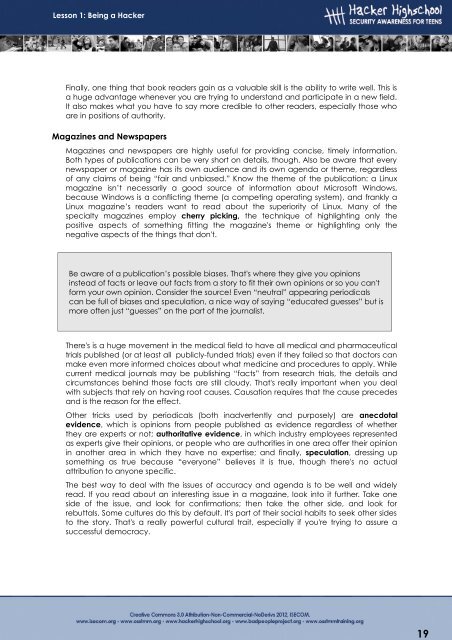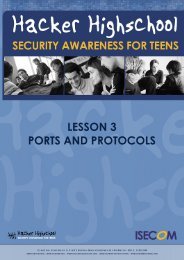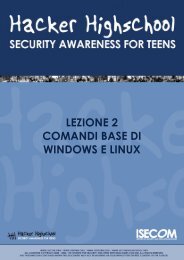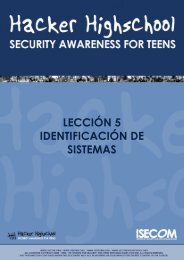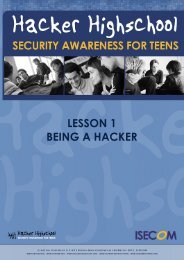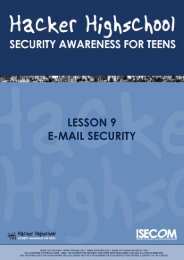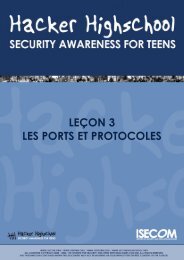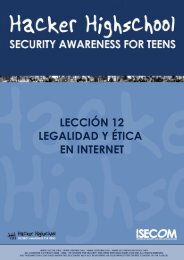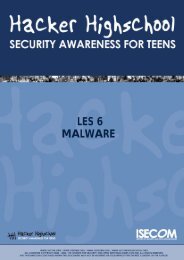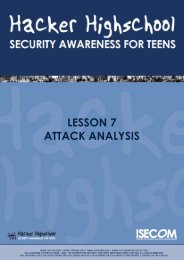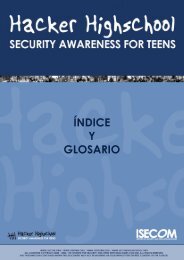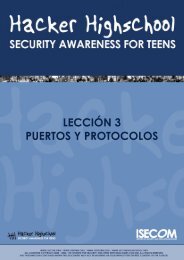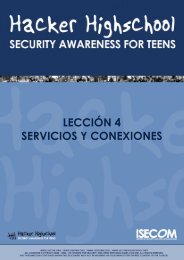Lesson 1: Being a Hacker - Hacker Highschool
Lesson 1: Being a Hacker - Hacker Highschool
Lesson 1: Being a Hacker - Hacker Highschool
Create successful ePaper yourself
Turn your PDF publications into a flip-book with our unique Google optimized e-Paper software.
19<br />
<strong>Lesson</strong> 1: <strong>Being</strong> a <strong>Hacker</strong><br />
Finally, one thing that book readers gain as a valuable skill is the ability to write well. This is<br />
a huge advantage whenever you are trying to understand and participate in a new field.<br />
It also makes what you have to say more credible to other readers, especially those who<br />
are in positions of authority.<br />
Magazines and Newspapers<br />
Magazines and newspapers are highly useful for providing concise, timely information.<br />
Both types of publications can be very short on details, though. Also be aware that every<br />
newspaper or magazine has its own audience and its own agenda or theme, regardless<br />
of any claims of being “fair and unbiased.” Know the theme of the publication: a Linux<br />
magazine isn’t necessarily a good source of information about Microsoft Windows,<br />
because Windows is a conflicting theme (a competing operating system), and frankly a<br />
Linux magazine’s readers want to read about the superiority of Linux. Many of the<br />
specialty magazines employ cherry picking, the technique of highlighting only the<br />
positive aspects of something fitting the magazine's theme or highlighting only the<br />
negative aspects of the things that don't.<br />
Be aware of a publication’s possible biases. That's where they give you opinions<br />
instead of facts or leave out facts from a story to fit their own opinions or so you can't<br />
form your own opinion. Consider the source! Even “neutral” appearing periodicals<br />
can be full of biases and speculation, a nice way of saying “educated guesses” but is<br />
more often just “guesses” on the part of the journalist.<br />
There's is a huge movement in the medical field to have all medical and pharmaceutical<br />
trials published (or at least all publicly-funded trials) even if they failed so that doctors can<br />
make even more informed choices about what medicine and procedures to apply. While<br />
current medical journals may be publishing “facts” from research trials, the details and<br />
circumstances behind those facts are still cloudy. That's really important when you deal<br />
with subjects that rely on having root causes. Causation requires that the cause precedes<br />
and is the reason for the effect.<br />
Other tricks used by periodicals (both inadvertently and purposely) are anecdotal<br />
evidence, which is opinions from people published as evidence regardless of whether<br />
they are experts or not; authoritative evidence, in which industry employees represented<br />
as experts give their opinions, or people who are authorities in one area offer their opinion<br />
in another area in which they have no expertise; and finally, speculation, dressing up<br />
something as true because “everyone” believes it is true, though there's no actual<br />
attribution to anyone specific.<br />
The best way to deal with the issues of accuracy and agenda is to be well and widely<br />
read. If you read about an interesting issue in a magazine, look into it further. Take one<br />
side of the issue, and look for confirmations; then take the other side, and look for<br />
rebuttals. Some cultures do this by default. It's part of their social habits to seek other sides<br />
to the story. That's a really powerful cultural trait, especially if you're trying to assure a<br />
successful democracy.


